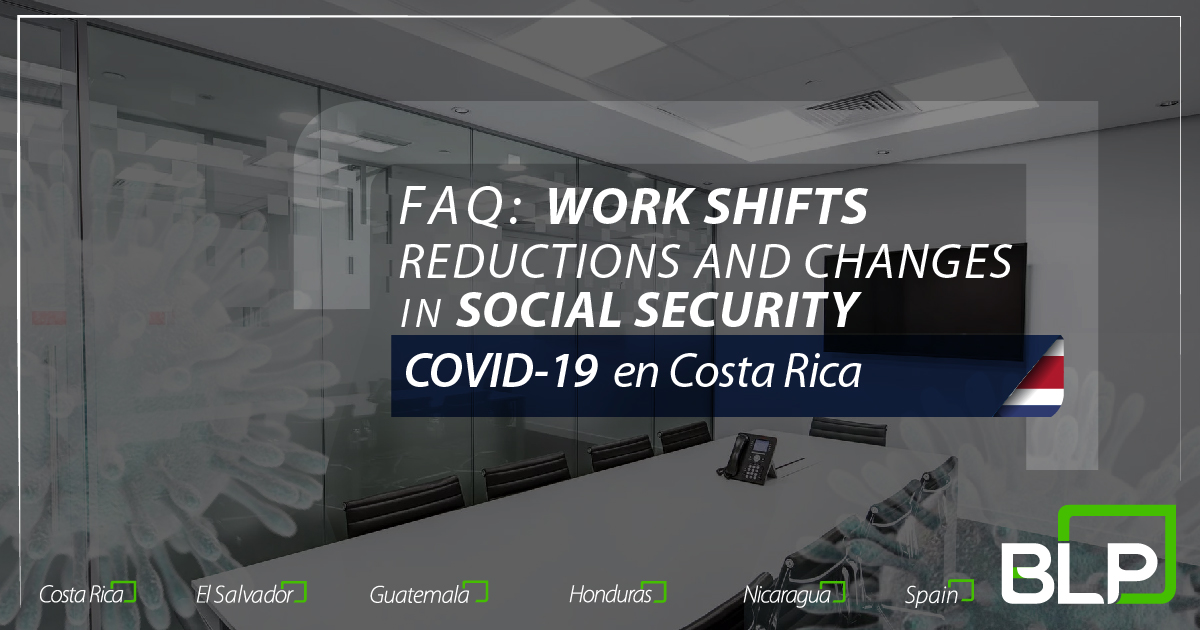On Saturday, March 21, 2020, the Legislative Assembly of Costa Rica approved the law that allows employers to reduce the hours and wages of workers, as a measure of relief and support in the face of the Coronavirus pandemic. The law is to give an employer the ability to cut wages and hours by 50%, if he can show that he has a negative difference in his gross earnings compared to the same month the previous year.
BLP shares a series of frequently asked questions related to this new Law:
Q: What is the work shift reduction?
A: It is the possibility that the employer can proceed in a unilateral way with the temporary modification of the work shifts that are agreed with their employees, because of the national emergency.
Q: In which cases can be applied the work shift reduction law?
A: When the employer can demonstrate the existence of a decrease of at least a 20% in the gross income of the company, and that affection can be assignable to the national emergency declaratory.
Q: How much can I reduce the work shifts if I experience and affection on the incomes of at least 20%.
A: It can be reduced in a 50%.
Q: How much can I reduce the work shifts if I experience and affection on the incomes of at least 60%?
A: It can be reduced on a 75%
Q: In order to make the change on the work shifts does the employer needs the approval of the employee?
A: Just in cases of the recent national emergency declaratory, the employer has the unilateral authority of modifying the work shifts without the employee approval.
Q: In order to modify the work shifts is it required any approval from an authority?
A: Yes, this modification has to be approved by the Ministry of Labor.
Q: What happens if the request of work shift reductions is denied?
A: The company must pay to the employees the salary differences according to the regular shift if the deduction wasn’t applied.
Q: For how long the work reduction shifts applies?
A: It can be stablished for a period of three months renewable for two equal periods.
Q: Can the work shift be reduced to a pregnant worker or in period of breastfeeding?
A: It’s not possible.
Q: Can I make a verbal agreement, or it must be written?
A: It is suggested that it is documented in a written way, stablishing the dates in which is applicable and the validity of that modification.
Q: When the work shift is reduced, can the salary be reduced?
A: Yes, the salary is reduced in a same proportion as the diminution on the working day.
Q: The Social Security has taken any agreement on the social charges because of the COVID?
A: Yes, the Costa Rican Social Security (C.C.S.S.) had made the decision of paying the social charges over reduced salaries during the next 3 months.
Q: Has the CCSS agreed to reduce the percentages of the social charges?
A: No, the percentages of contribution are still the same.
Q: Has the minimum contributory salary been reduced for the influence of the COVID?
A: Yes, the minimum contributory salary has been reduced to ₡73.654 for the sickness insurance and maternity and to ₡68.639 for the invalidity regimen, old age and death.
Q: For how long will the agreement of the CCSS will last?
A: 3 months.
Q: How these dispositions applies to workers with Special Protection?
A: In this case, the work shift reduction will only proceed when it is stablished for at least a 90% of the company staff.
We have a 24/7 service to address your legal queries related to the effects of COVID-19 in your company. Contact us through our Help Desk for immediate assistance at: [email protected]. Access to our Media Room for further information about legal aspects related to Coronavirus in Central America at this link



